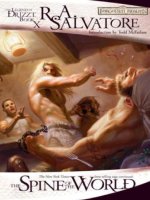WORLD BOOK WORLD BOOK WORLD BOOK 0156 0156
Bạn đang xem bản rút gọn của tài liệu. Xem và tải ngay bản đầy đủ của tài liệu tại đây (1.04 MB, 1 trang )
Priestly Magic
Game Details
• A priest’s reputation and role-playing determines
how many worshipers follow him based on his personal charisma and personality. Apply the appropriate
game rule for determining followers in this manner.
• Worshipers demand frequent demonstrations by
priests or they may lose faith and wander away
• Priests are less mobile, as worshipers tend to wander
off in their absence
• Additional worshipers can help the caster in a “harmonious” manner (see “Harmonious Magic” below)
• Each god’s attention is mercurial. The more consistent gods are weaker, while the more powerful are
maddeningly unreliable
• Any powerful creature extant upon Khitus or the unreachable beyond can pass itself off as a god so long
as it can tap into the vast magical reservoir that powers the sun, moves the planets, etc.
• The original Dragon Kings could do this, but interrupted contact with this enormous power forced
most of them off-world to defend Khitus, their ultimate results inconclusive
• A priest’s access to god-granted magical abilities is
directly linked to his most recent success as a proselytizer, often regardless of his long-term contribution of worshipers.
increase their reputation—and that of their religion—to
span the next drought of magical power or divine attention.
Of more immediate importance, however, is the Shadazim’s success proselytizing, bringing new worshipers
to his god. A god expects progress and punishes lethargy by withholding magical energies, either partially or
completely. A Shadazim must always struggle against the
relative skepticism that the ancient gods still exist, compared with the inherently believable teachings of the
Trakeen whose Dragon King deities are widely accepted
as genuine, though their access to actual god-granted
magic gives them a compelling argument for legitimacy.
Harmonious Magic
Music and magic are inseparable, and even the most
reclusive spell caster chants incantations with a simple
rhythmic rise and fall. Harmonious application is com154
mon to all Khitan spell casting for delivering or enhancing magic. The two are inherently linked, as the best
music carries undeniable magical qualities to it and
vice versa. Laypersons with no magical tendencies at all
can participate in magical enhancement through musical talents alone, though most must conquer their fear
of dark sorcery’s wrath to do so. A wizard who masters
both skills takes his craft to a much higher level.
Khitan magic often demands multiple casters for a desired magical effect, the key being the use of harmonious magic. Music relaxes the mind and unleashes unseen
paths to blend separate magical notes into pleasant, even
complex chords. This is not stealthy magic, for voices and
instruments must be heard upon the wind. The harmony
also needs to reverberate through all casters, spell components, objects to be affected, and so on. Harmonious
magic is as common a rudiment to the fledgling spell
caster as his spell books and somatic gestures.
Among wizards, harmonious magic allows two or more
to combine their efforts and surpass individual limitations. Chanting the same spell at the same time is the base
level of harmonious cooperation. Greater effects come
from matching keys, crafting more accurate harmonies,
or adding instrumental accompaniments. Skilled musicians who understand harmonious magic, gifted with
such abilities or not, can also add to the effects. Most often, wizards must form an ensemble of their own kind to
fully gain any benefits (or mitigate any consequences).
Priests have more latitude in tapping the musical enthusiasm of zealous followers to amplify their magic.
They can combine spell casting through cooperation,
just as wizards do. They also gain incremental advantages for each layperson that joins their voices, regardless of that person’s abilities. A choir of worshipers focuses a priest’s magic and secures a deity’s attention
for greater (or perhaps more regular) magical effect.
Additional voices need not be willing voices, though,
depending on the harmony demanded by the leading
voice. In some cases, coerced participants are more effective for a priest’s darker purposes, utilizing screams of
pain into the melodic pleas to an angry god.
In all cases, harmonious magic allows casters to reach
beyond their normal capabilities. Those who successfully build a magical ensemble can achieve spells unreachable as individuals, beyond the horizon of present
skill sets. More commonly, harmonious magic helps
them make known spells more intense, longer in duration, greater in range or area, or simply more awe-inspiring or terrifying.
Harmonious magical effects increase with the sophistication or complexity of the musical accompaniment.
At its simplest level is unison chanting , which is easy to









